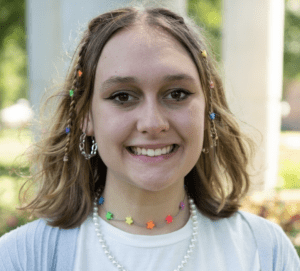Junior Earns NASA Research Award
September 14, 2020Tori Snyder, a junior physics major, spent this past summer conducting research funded by a NASA Space Research Grant.
Snyder worked to set up a study of galactic motion with physics professor Dr. James Wanliss. The pair began by setting up a plan of what to study and determining how to go about it using technology and methods used by space scientists.
“I wasn’t familiar with the structure of the language or how to make the best use of it prior to this summer,” Snyder said, “so I needed support on programming tasks.”
Out-of-this-world Research
Snyder and Wanliss examined how the galaxy is a plate and how matter moves along this plate. This allowed them to expand their knowledge of outer space, galactic motion and generate future research questions, such as the possibility that these plates can actually show the age of Earth.
“We were the first ones to work on this research topic,” Snyder said. “Dr. Wanliss runs the Space Weather Undergraduate Research Lab on campus. He decided to formulate the new idea at the beginning of last semester and asked if I’d be interested in working on it.”
Wanliss helped Snyder in her work on space by teaching her about the math and programming needed to complete the research. This included gravity simulation using a specific programming language, differential equations, and numerical methods.
The two used Google Classroom to meet and discuss Snyder’s research questions.
“We were both new to this project, so Dr. Wanliss gave me great advice on where to take my research and how to conduct it,” Snyder said.
Using Current Opportunities for Future Success
Snyder, whose main interests lie in space science and astrophysics, is on the path to a PhD in physics. This research, funded by her NASA grant, was the first research project she has worked on. Snyder’s decision to complete research at PC will open up future opportunities for her to work and research more at other universities.
“A lot of research programs only take eight to 10 students, so this was my gateway into this kind of work,” Snyder said. “I’m keeping my options open while also setting my sights on a Ph.D. because at the very least I know I want to dedicate my life to learning as much as I can.”
Learn More
To learn more about opportunities like Snyder’s, please visit the Department of Physics and Computer Science. Please visit Student Research to learn more about opportunities available to you.













